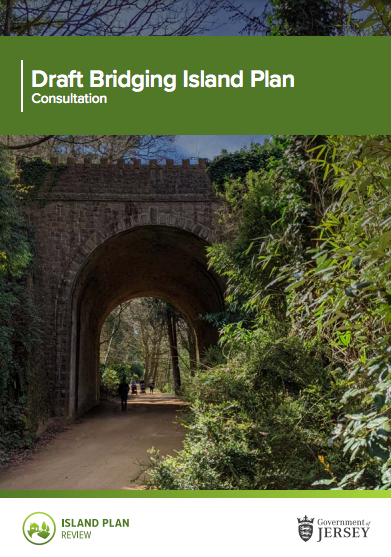


Business leaders have heavily criticised the short-term Island Plan, calling it a “...rushed document based on erroneous and unsubstantiated evidence."
In its submitted comments on the three-year planning blueprint – which was scaled back from its usual 10-year span due to the uncertainties of covid – the Chamber of Commerce says the document is incomplete and cannot be objectively assessed.
Last week, the Environment Minister published his initial responses to the more than 2,000 comments – including the Chamber’s – and 60 amendments lodged by States Members since the plan was first published in April.
Deputy John Young rejected the vast majority of proposed changes, most controversially the call to remove fields from the plan which have been been earmarked for housing, arguing that a balance had to be struck between housing and the environment.
He also dismissed the 38% of commenters who called for a field in St. Peter, which the minister wants to ‘safeguard’ for mineral extraction by the next-door quarry, to be saved.
The Chamber of Commerce is specifically critical of the plan from an industry perspective.
“It is Chamber’s view that the bridging Island Plan is a rushed document based upon erroneous and unsubstantiated evidence,” it says. “The timescale for the DBIP has resulted in it being an incomplete document, dependent upon supplementary guidance which is as yet unavailable and whose content and consequences are unable to be objectively assessed.

Pictured: The Chamber of Commerce argue that the three-year bridging Island Plan is, in fact, a full-blown plan in itself.
“It represents far more than a ‘bridging plan’, and in fact represents a sea-change in both the format of the plan and in the introduction of highly onerous new policies which will severely affect the sustainable economy of the Island and prevent the broader strategic aims of the Plan.
“A number of the key policies, while obviously well-intentioned, are ill-considered and unimplementable.”
Chamber continues: “The draft bridging Island Plan is far too important a document in the context of the Island’s sustainable economy to be rushed through to adoption, and more time is required to properly understand the full consequences.
It is effectively an ‘objector’s charter’ and, contrary to the aims of sophisticated planning systems in general, will result in far less certainty of outcome for applicants.
“It would be more appropriate, as a bridging mechanism, to address those elements of the current Island Plan [2011-21] which are not working, giving time for proper and considered development of the new Island Plan in three/four years’ time.”
Giving some background to its objections, Chamber argues: “In light of the uncertainty created by both Brexit and, in particular, in light of the restrictions and work limitations imposed by the fight against the coronavirus, the expectation of most within the construction and development industry was that the Bridging Island Plan would be a short-term but well-considered fix for those elements of the current Island Plan which are known to be inadequate, allowing time for a properly assessed and evaluated, more comprehensive Island Plan to be prepared and approved at the end of the life of the Bridging Plan.
“However, the bridging plan is, in fact, a fundamental re-working of the Island Plan incorporating major amended strategic policy initiatives, an almost unprecedented planning zoning re-definition, and a significant change in the layout and organisation of the Plan.
“It is suspected that, far from being a Bridging Island Plan, this document is actually the originally intended Revised Island Plan with work commissioned for that document incorporated.

Pictured: Chamber thinks the plan puts too much power in the hands of objectors.
“However, the investigation, consultation and analysis that should have been undertaken in respect of new contributory studies and proposals has not been undertaken, due, in part, to the reduced potential for these exercises brought about by the coronavirus.
“The implications of this are that significant and potentially damaging new Island Plan policies are effectively being pushed through at pace without giving time for due analysis and representation.”
Chamber also voices concern about the impact of the plan on the planning applications’ process.
“The presence of contradictions within the Island Plan […] allow planning officers to select those parts of the plan which meet preconceived departmental objectives.
“The same contradictions and inconsistencies [are] able to be used selectively by objectors to planning applications to block development. The third-party appeal system operating in the Island [also] promotes an overly cautious interpretation of the IP policies.”
In his response to Chamber’s strongly worded objections, Deputy Young says: “The policies of the Island Plan have been carefully formulated to achieve the sustainable development of the island with a balance between social, environmental, and economic considerations.
“The policies do not stand in isolation and should be read together, with other relevant policies and the proposals, as a holistic response to the needs and issues facing the island, which is supported by the evidence collated to support preparation of the plan.”
FOCUS: Fields marked for affordable homes in short-term Island Plan
FOCUS: Battle lines drawn over affordable homes sites
Campaigners fight building on remaining organic farms
Residents pledge to fight St. Peter's Valley quarry expansion
INSIGHT: Island Plan...what the people REALLY care about
St. Ouen's Bay quarry "shocked" over plan to shut it by 2024
Bid to cut quarry expansion from Island Plan
Minister rejects attempts to save fields from housing and quarrying
FOCUS: "We have a housing crisis and a balance has to be struck"
Comments
Comments on this story express the views of the commentator only, not Bailiwick Publishing. We are unable to guarantee the accuracy of any of those comments.